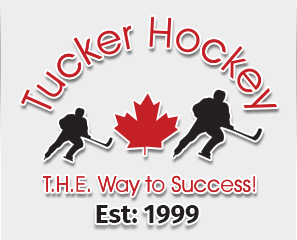We are only a few months away from another minor hockey season and of course that means player evaluations! It can be a very stressful and anxiety filled time for both players and their families. Below is a Tucker Hockey player tryout checklist to help players and their parents increase their awareness and knowledge about getting ready for September evaluations. Hope you enjoy the read and will feel better prepared to do your best on the ice! All the best with tryouts!
| PLAYER TRYOUT – TOP 10 CHECKLIST | |||||||||||||
| 1 | Preparation | ||||||||||||
| a) | Get plenty of rest the night before | ||||||||||||
| b) | Equipment is ready – Skates sharpened, equipment bag checked for all items | ||||||||||||
| c) | Good pre-game meal, minimum 3 hours prior to competition | ||||||||||||
| d) | Arrives at the rink minimum 45 minutes prior to competition – not rushed | ||||||||||||
| e) | On the bench, keep head in game | ||||||||||||
| i) | Talk to line mates – the better they play, the better you look | ||||||||||||
| ii) | Watch the play on the ice – measure your competition for making the team | ||||||||||||
| iii) | Avoid dehydration – drink before you’re thirsty!! | ||||||||||||
| 2 | Remember the important “cue words” when you get to the rink | ||||||||||||
| a) | Relaxed – not too nervous or anxious | ||||||||||||
| b) | Focused – Concentrate on the on-ice activities and success | ||||||||||||
| c) | Confident – in your ability to make the team, building on past successes | ||||||||||||
| d) | Energized – you feel good, ready to handle any challenge | ||||||||||||
| 3 | Three major criteria which all coaches/evaluators use to select their team are: | ||||||||||||
| a) | Skating – quickness, speed, agility | ||||||||||||
| b) | Hockey sense – Reads the play well, makes good quick decisions, positional play | ||||||||||||
| c) | Character – Strong work ethic, leads by example, competitiveness | ||||||||||||
| 4 | Know and show your strengths | ||||||||||||
| a) | If you’re a skater – “skate’, shooter – “shoot”, passer – “pass”, etc | ||||||||||||
| b) | Know what you bring to the team | ||||||||||||
| 5 | Believe in your hockey abilities | ||||||||||||
| a) | You’re good enough to make this team | ||||||||||||
| b) | That you want it – willing to pay the price | ||||||||||||
| c) | Put it all out on the ice – don’t have any regrets | ||||||||||||
| 6 | Stand out from the crowd – get noticed | ||||||||||||
| a) | Give 110% during every shift or drill | ||||||||||||
| b) | Want the puck – play around the puck, not on the perimeter | ||||||||||||
| 7 | Play with intensity – elevate your game to the next level | ||||||||||||
| a) | Don’t take “shifts off” | ||||||||||||
| b) | Finish the scrimmage as good as you started | ||||||||||||
| c) | Be consistent with all drills from start to finish, no “cheating on a drill” | ||||||||||||
| d) | The pain of fatigue is only temporary – it goes away | ||||||||||||
| e) | Don’t be a cheater or pouter, be a worker and a leader | ||||||||||||
| 8 | Overcome adversity | ||||||||||||
| a) | Making a bad play/decision | ||||||||||||
| b) | Making a mistake during a drill – stumbling/falling | ||||||||||||
| i) | Park the mistake and move on – learn and grow | ||||||||||||
| 9 | Objectively evaluate your on-ice session | ||||||||||||
| a) | Build on your successes – a good goal, pass, or check | ||||||||||||
| b) | Look at areas for improvement for a better next session | ||||||||||||
| 10 | Be proud that you gave it your very best | ||||||||||||
